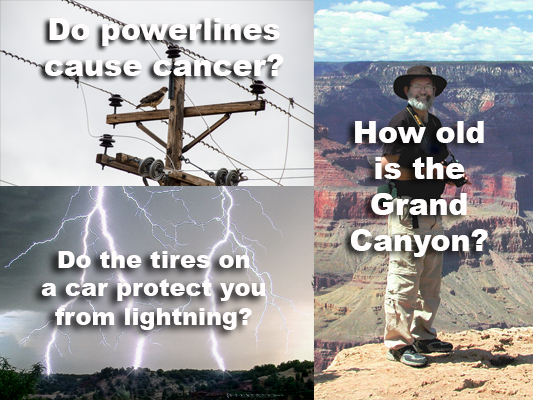This is part three of a series on posts on fact checking science related articles.
Read part one of this series. -- Part 2 - Part 4

Fact Checking a Science Article.
OK, so you just read an article about an astounding new discovery that has amazed scientists, and is so shocking you that it sets off your fact checking alarms. How do you find out if it is real or not?
- If your fact checking alarm is going off, the first step is to go to some of the fact checking sites. If someone else has already fact checked the article, why reinvent the wheel? The one I use the most for general fact checking is Snopes. http://www.snopes.com
If you find something on your topic, be sure to read carefully. Often, you will find that some parts of an article are factual and other parts are not.
Do you think Snopes is biased? No problem. Fact check Snopes by actually looking at their references for the article. I have found that they do an excellent job of backing up their information with links to the original sources, and reading the original source often clarifies things.
While you are on the site, be sure to take a look at the Hot 25 to see the most widely circulating stories that are being fact checked. Not all of them are false or hoaxes, but this is a great way to hone your fact checking skills.
- You can also go to your favorite search engine and do a search for the main topic of the post, plus the words such as “hoax”, “review”, and “fact check”. So if the article you are fact checking says that coffee cures cancer, you could search for: coffee cures cancer hoax
Your search may give thousands of results, many of which have nothing to do with the article you are fact checking. Scan the first few pages of results. Be cautious of sites that are biased on the subject. With our coffee cures cancer example, you should be skeptical of information from sites such as welovecoffee.com, and wehatecoffee.com.
Look for articles from major science sites. Just having the word “science” in the name of the site is not enough. Look for sites with a long reputation of accurate science reporting. An article on Scientific American or National Geographic is likely to be scientifically accurate.
- Learn the science. While it takes some time and effort, understanding the science behind a topic is the very best way to spot problems in a science article. This is especially true if it is a topic that you feel strongly about. If you care enough to get emotional about GMOs, climate change, evolution, etc., take the time to learn the science. This makes it MUCH easier to sort fact from fiction, and can keep you from sounding foolish when you talk about the subject.
Be sure to find a neutral source as a starting point for learning the science. Once you have a good foundation, then start digging through the sources that are pro and con for the topic. This is where you have to be especially careful about confirmation bias. Do serious fact checking for both sides, being just as critical of the side you agree with.
A common way to camouflage misinformation is to use technical jargon. When most people reach that part of the article, their eyes glaze over. This is where understanding the science makes a huge difference. Once you know the basic science, it is much easier to see through this kind of article.
- Look at the original source. Make sure that quotes are not taken out of context, and that the original source really said what the article claims.
Be prepared. Even with a background in science, digging through an article from a scientific journal can be challenging. Next time, I will go into detail for how to find some of the important parts of a journal article.
